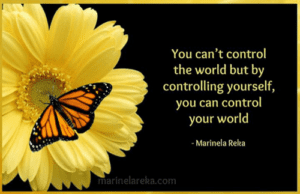30 Day Challenge/Day 13: Controlling Yourself
In any given situation the more that we can control the aspects of the situation, the more favorable the outcome would be to our advantage. I realize this seems fairly obvious but so often in a frantic situation, we lose sight of this.
Now we state control “Yourself” because our youth tend to identify with that term more. It would be appropriately as stated in our 1st Day Article, control “Self.”
We start our training by helping participants recognize if they are in control of themselves physically. Are they able to hold a position for a period of time, can they touch, hit, manipulate a specific target, can they transition from one hand to the other, etc.? We then start to work towards more perceptual aspects and are they recognizing indications; seeing, hearing, feeling, etc.? Yes, if we are in control of what we are paying attention to, we will recognize situations and opportunities sooner. With that, we then can control and avoid distractions that interfere with our ability to correctly interpret events. We then can control how we respond and reframe our emotional connection with the situations and opportunities.
Through day-to-day incremental disciplining ourselves to “Be in Control” over time, we develop a much easier feeling about ourselves and our interaction with the environment. As we stated in Day 5 about Ease we become more familiar.
Here is an interesting concept of the term “Boredom” and how theoretically it can have a positive role in our training. When we do something with several repetitions the same way, we develop and strengthen the Myelin which is the sheath that forms around nerves, including those in the brain and spinal cord. This allows the electrical impulse to move more freely from our thought to the muscles, tendons, etc. involved in the action. We technically reduce the “distractions.” (For more on this talk with Mr. John Correia about the role of myelin and also about franetic motions. He is probably more versed in these subjects than I am.) Now that we have reduced the opportunity for internal distractions, our minds and body are more closely connected. This will allows us the opportunity to shift our focus on other aspects of the situation. So, ideally we could view “boredom” as the point of training the basics of each move so deeply that our brains (or subconscious) and body are connected (also known as deep training) allowing our conscious mind to be able to focus outwardly (on results and planning) and not inwardly (on coordinating the move).
While learning to control ourselves during simple activities, we learn to control our focus, thoughts, emotions, heartbeat, breathing, etc. Over time, we can increase the intensity of our training to challenge ourselves for continued control in more difficult situations. If we can initially control ourselves in any situation we have the foundation to expand that control beyond our immediate “self”.


